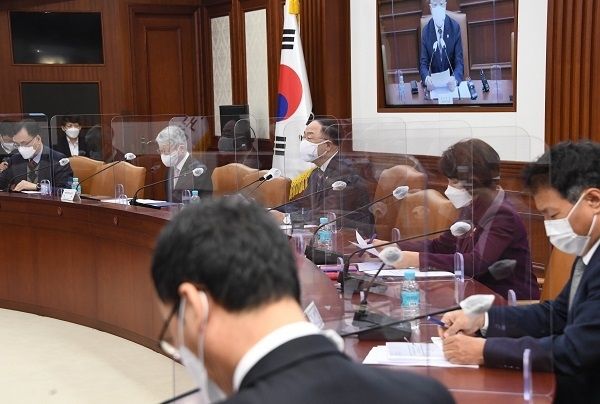[한국방송/최동민기자] On the 1st, Hong Nam-ki, Deputy Prime Minister of Economy and Ministry of Strategy and Finance, announced on the 1st, “We will expand 3,000 electric vehicle rapid chargers this year with the goal of creating a more convenient charging environment than gas stations.”
Deputy Prime Minister Hong held the 4th Innovation Growth BIG3 Promotion Meeting at the Seoul Government Complex on the same day and said, “Creating a convenient charging environment in line with the expansion of electric vehicles is a very important task at hand.”

Deputy Prime Minister Hong Nam-ki and Minister of Strategy and Finance presided over the ‘4th Innovation Growth BIG3 Promotion Meeting’ held at the Seoul Gwanghwamun Government Complex in Seoul on the 1st, and are all speaking. (Photo = Ministry of Strategy and Finance)
Accordingly, the government will directly install 2280 units of rapid chargers, led by the public sector, for high installation costs and limited voluntary installation by the private sector.
In addition, 289 units will be installed in places with high accessibility and profitability through support from private businesses, and 300 units will be installed at existing gas stations that can be used conveniently by drivers through support for the construction cost of chargers.
It plans to install 43 ultra-fast chargers for the first time in the public sector, which drastically reduced the charging time from 1 to 9 hours to 20 minutes, and to support power, site security, and construction so that car companies can install more than 80 on their own.
The meeting also discussed agenda related to support for system semiconductor technology innovation to foster global K-fabless.
Deputy Prime Minister Hong said, “The competitiveness of foundries has been increasing through facility investment and technology development, but the competitiveness of relatively small fablesses is still weak.” We plan to provide up to 5.5 billion won to companies for 3 years each.”
7 additional R&D projects related to demand in the fields of artificial intelligence (AI) semiconductors, automobiles, and Internet of Things (IoT) will be supported. In addition, the power semiconductor production infrastructure from 300 units per month last year will be increased to 600 units per month this year, and a full-cycle support system for the next-generation sensor industry will be established.
In addition, in order to preoccupy the new AI semiconductor market, it will invest 122.3 billion won on a flagship project for design, device, and process technology innovation, and also review a preliminary feasibility study for a 1 trillion won PIM semiconductor (memory + processor integration).
The meeting also dealt with agenda for expanding bio-production competitiveness.
The government will actively promote R&D for localization of 16 items of key raw materials and subsidiary materials and small equipment in the bio industry by 2024.
Deputy Prime Minister Hong said, “Through a continuous process system that monitors the production process in real time, the time required for the pharmaceutical manufacturing process is significantly reduced by half compared to the previous time, thereby helping to improve productivity and improve quality.” We will support non-clinical sample production and build a bio-manufacturing center to cultivate 2,000 production manpower.”
It also discussed the plan for intensive support for patents in the Big 3 industry.
Deputy Prime Minister Hong said, “Of the 500,000 patent applications in the Big 3 field, Korea is 37,000, the third place after China, but the quality of patents is low and patent infringement litigation is increasing.” We will support customized patent strategies based on big data for 100 projects, and expand the funding for overseas patent applications for SMEs.”
